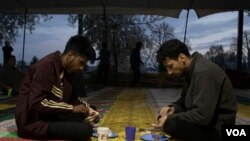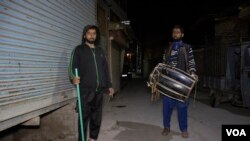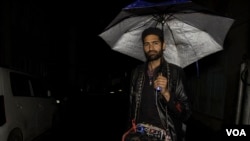On a Monday afternoon the streets of Rainawari neighborhood of Srinagar on the Indian side of Kashmir were soaked by heavy rainfall. Despite weather forecasts predicting a downpour, Khair Ullah Mughal and his brother Habeeb Ullah Mughal set out from their ancestral three-story house in the middle of the overcast night.
Khair, 60, carried the drum on his shoulder, beating it all along the way through various areas of Rainawari, shouting “time for Suhoor.” However, Habeeb, 57, carried a long stick in his hands as a defense against animals such as stray dogs and porcupines.
Suhoor is Muslims’ predawn meal consumed during Ramadan before the day’s fasting begins.
“For 30 years, we have carried on our father’s legacy since his passing,” said Khair. “Our goal in taking to the streets during the holy month in the dead of the night is to rouse people from their slumber so they can consume Suhoor before beginning their fast,” he said.
“We begin our night shift at 2:30 a.m. and return home after an hour and a half, so that we too can fulfill fasting rituals,” Khair said. “Over the last three decades, we have not missed a single night, as we carry a huge responsibility on our shoulders,” he added.
The tradition of awakening people for Suhoor in Kashmir traces its origin to the14th century, following the arrival of Islam in the region from Central Asia.
Zareef Ahmad Zareef, a noted historian from Kashmir, told VOA that some individuals voluntarily used to wake up early and blow rams’ horns to signal Suhoor for locals.
“The horn of the ram had a small hole on its front, and it would make some noise when air was forced through it,” Zareef said. “These individuals were later given the name Sahar Khawans,” he said, adding with the passage of time these some of them made it a part of their profession to earn extra income and at the same time introduced the use of drums in the valley.
“The reason behind introducing drums could have been that its sound reaches more people,” Zareef said. “Since then, the drums have become an integral part of the Ramadan in the region,” he added.
Every year, Sher Ahmad Querishi, a Ramadan drummer from Kupwara district of north Kashmir, eagerly waits for Ramadan. He visits Habba Kadal area in Srinagar to beat his drum and wake people up for 30 consecutive nights.
“We don’t beat drums for money, but for the sake of earning good deeds,” Querishi told VOA. “Despite being engaged in different professions during the day, at night, we become drummers, sacrificing our comfort and sleep,” he added.
Ramadan drummers, Querishi said, do not make much money, as they are paid just 50 to 60 cents by each household. He added that drummers are usually poor and come from different rural areas of the Kashmir valley.
“Most of us hail from villages either in north or south Kashmir. Only a few drummers are from cities such as Srinagar and they too belong to economically poor classes,” Querishi said. “In Ramadan we work through day and night apart from fulfilling all the religious duties,” he said.
Habeeb Ullah Mughal said the numbers of Ramadan drummers are dropping every year, as people no longer depend on them.
“Until the last decade we were relevant in the society, but the invention of new technologies, such as mobile phones have made us irrelevant in modern times,” Habeeb said. “We used to cover a large area but in the last couple of years we have narrowed our circle as people objected, saying we disturb them and there is no need to visit their area as they set alarms on their mobile phones,” he added.
The younger generation, Habeeb said, is also not interested, and, as a result, the numbers of Ramadan drummers are gradually dropping.
“The reason for not carrying the tradition is best known to the younger generation,” Habeeb said. “As far as our family is concerned we have no male members who could carry the centuries old tradition after us,” he added.
Meanwhile a young man who identified himself as Ghulam Hassan Khan, 25, uses tape-recorded to wake people for Suhoor. He said he has recorded the message and plays the tape in at least three Srinagar areas.
“For three years I have been using tape recorder to wake people up for Suhoor,” Khan said. “My father was a drummer but after he passed away a few years ago I decided to follow his path,” he said, adding the reason he chose to use tape recorder instead of the traditional drum is that he cannot afford the cost of over $200.







